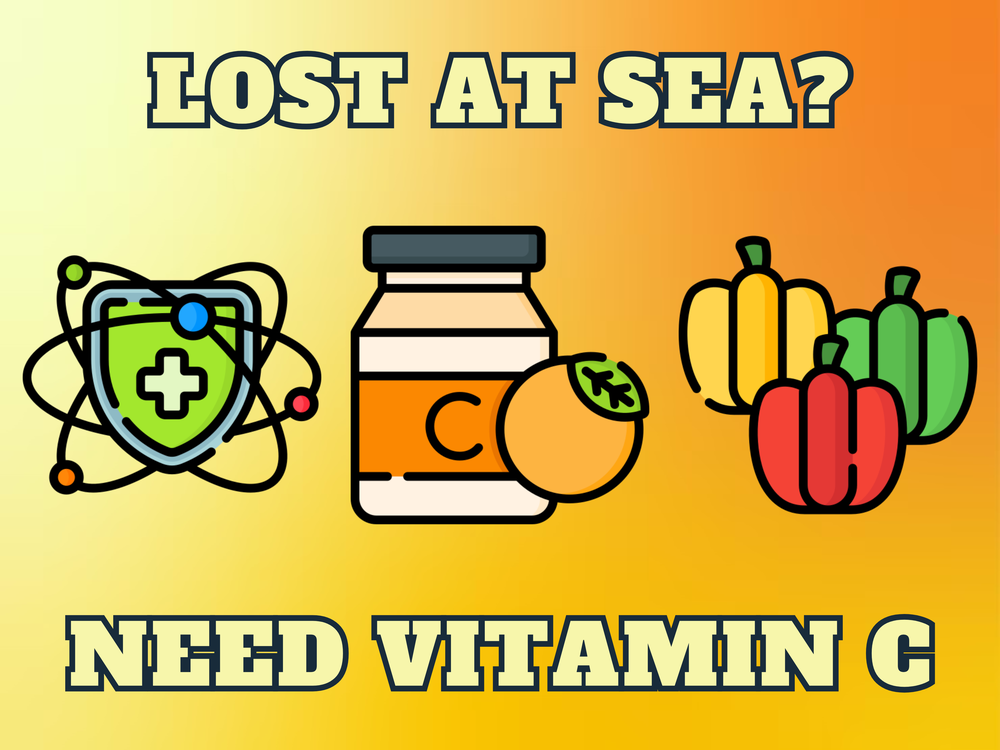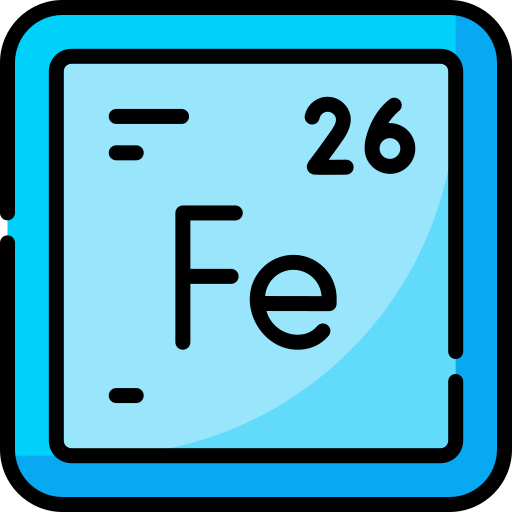
Introduction
Vitamin C, also known as ascorbic acid, is an essential vitamin that's needed in your body to form collagen, muscle tissue, blood vessels, and cartilage. The body cannot produce vitamin C on its own, so you must consume it, either through food or supplementation. The most talked about source of vitamin C is fruit, typically citrus fruits like oranges and lemons, though higher amounts of vitamin C are also found in vegetables as well, like broccoli and bell peppers.

Vitamin C feels like the opposite of vitamin B12; while the former is pretty much only found in plants, the latter is only found in animals. All the more reason to eat a balanced whole foods diet, and not restrict youself to eating either just plants or just animals. Ever wonder why pirates would get scurvy? Because they didn't have access to fruits and vegetables for months or potentially years at a time. As such, they weren't consuming vitamin C.

Vitamin C, as well as the B vitamins (B1, B2, B3, B5, B6, B9, and B12), are all what's known as water soluble vitamins. This means that (unlike vitamins A, D, E, and K), vitamin C doesn't need to be consumed with fat to be fully absorbed. It also means that any excess will simply be excreted through urine, so there's little to no risk in "overdosing" on vitamin C.

High Vitamin C Foods

Role of Vitamin C
As mentioned, vitamin C plays a crucial role in the body's formation of collagen, muscle tissue, blood vessels, and cartilage. It is also a potent antioxidant, helping to protect the cells in your body against the effects of free radicals. Additionally, proper consumption of vitamin C leads to more effecient absorption of iron.

Moreover, vitamin C may have cancer fighting properties, and the antioxidant effects of vitamin C help to lower inflammation. But what I bet you think of when you hear vitamin C is any sort of sickness. While vitamin C will not prevent you from getting sick, it may certainly help you recover faster. VItamin C can support the immune system by enhancing the production and function of white blood cells, as well as protecting them against oxidative stress.

Benefits of Vitamin C

Symptoms of Low Vitamin C

Vitamin C Supplementation
Vitamin C is very accessible in foods, as long as you eat plenty of fruits and vegetables. However, you can choose to supplement if you require more vitamin C. Typically, vitamin C can be found in most multivitamins, but you can take a dedicated vitamin C supplement as well. Most vitamin C supplements will contain well over 100% of your daily value (DV) of this essential vitamin. A very quick, back of the napkin calculation is that 1 mg of vitamin C is roughly equivalent to 1 % of the DV (the actual number is 1 mg vitamin C = 1.11% DV).

As always though, consult with your doctor and get your blood levels tested. Since vitamin C is a water soluble vitamin, there's little risk of taking "too much". Any excess in the body will simply be peed out.

Daily Consumption

Foods High In Vitamin C
Vegetables (Raw)

Fruit

Best Sources of Vitamin C
Per serving: Bell Peppers - 152 mg (1 medium, 119 g)
Per 100 g: Guava - 228 mg
Per 100 cal: Bell Peppers - 491 mg

Wrapping it Up
Vitamin C is an essential water soluble vitamin found mainly in fruits and vegetables. It is a powerful antioxidant, and plays an important role in immune system health. I'm sure you've all heard the myths about taking vitamin C or drinking orange juice to ward off a cold. Vitamin C is also important for the absorption of non-heme iron in the body. A deficiency in vitamin C can lead to scurvy, poor skin health, and poor immune health. The recommended daily intake of vitamin C is 90 mg for men and 75 mg for women.
Benefits

Sources
This post may contain affiliate links
Vitamin C, also known as ascorbic acid, is an essential vitamin that's needed in your body to form collagen, muscle tissue, blood vessels, and cartilage. The body cannot produce vitamin C on its own, so you must consume it, either through food or supplementation. The most talked about source of vitamin C is fruit, typically citrus fruits like oranges and lemons, though higher amounts of vitamin C are also found in vegetables as well, like broccoli and bell peppers.

Vitamin C feels like the opposite of vitamin B12; while the former is pretty much only found in plants, the latter is only found in animals. All the more reason to eat a balanced whole foods diet, and not restrict youself to eating either just plants or just animals. Ever wonder why pirates would get scurvy? Because they didn't have access to fruits and vegetables for months or potentially years at a time. As such, they weren't consuming vitamin C.

Vitamin C, as well as the B vitamins (B1, B2, B3, B5, B6, B9, and B12), are all what's known as water soluble vitamins. This means that (unlike vitamins A, D, E, and K), vitamin C doesn't need to be consumed with fat to be fully absorbed. It also means that any excess will simply be excreted through urine, so there's little to no risk in "overdosing" on vitamin C.

High Vitamin C Foods

Role of Vitamin C
As mentioned, vitamin C plays a crucial role in the body's formation of collagen, muscle tissue, blood vessels, and cartilage. It is also a potent antioxidant, helping to protect the cells in your body against the effects of free radicals. Additionally, proper consumption of vitamin C leads to more effecient absorption of iron.

Moreover, vitamin C may have cancer fighting properties, and the antioxidant effects of vitamin C help to lower inflammation. But what I bet you think of when you hear vitamin C is any sort of sickness. While vitamin C will not prevent you from getting sick, it may certainly help you recover faster. VItamin C can support the immune system by enhancing the production and function of white blood cells, as well as protecting them against oxidative stress.

Benefits of Vitamin C
- May lower risk of cancer
- Formation of collagen, muscle, blood vessels, and cartilage
- Fight free radicals
- Reduce inflammation
- Improve sickness symptoms
- Reduce risk of chronic disease
- Lower blood pressure
- Lower risk of heart disease
- May prevent against gout
- Aid in absorption of iron
- Strengthen your immune system
- Protect your memory as you age
- Accelerate wound healing
- Protect your eyes and prevent cataracts
- Promote healthy skin
- Improve heart health
- Support brain function and neurotransmitter production
- Reduce uric acid levels and risk of gout
- Prevent scurvy
- Reduce severity and duration of common cold

Symptoms of Low Vitamin C
- Scurvy
- Fatigue
- Irritability and mood changes
- Poor wound healing
- Dry or splitting hair
- Rough or dry skin
- Frequent bruising
- Bleeding and inflamed gums
- Getting sick often
- Joint pain
- Nosebleeds
- Anemia
- Depression

Vitamin C Supplementation
Vitamin C is very accessible in foods, as long as you eat plenty of fruits and vegetables. However, you can choose to supplement if you require more vitamin C. Typically, vitamin C can be found in most multivitamins, but you can take a dedicated vitamin C supplement as well. Most vitamin C supplements will contain well over 100% of your daily value (DV) of this essential vitamin. A very quick, back of the napkin calculation is that 1 mg of vitamin C is roughly equivalent to 1 % of the DV (the actual number is 1 mg vitamin C = 1.11% DV).

As always though, consult with your doctor and get your blood levels tested. Since vitamin C is a water soluble vitamin, there's little risk of taking "too much". Any excess in the body will simply be peed out.

Daily Consumption
- Men: 90 mg
- Women: 75 mg
- Pregnant: 85 mg
- Breastfeeding: 120 mg

Foods High In Vitamin C
| Food | Serving Size | Vitamin C Per Serving |
Vitamin C Per 100 g |
Vitamin C Per 100 cal |
|---|---|---|---|---|
| Bell Pepper | 1 medium (119 g) |
152 mg (169 %) |
128 mg (142 %) |
491 mg (546 %) |
| Broccoli | 1 cup (91 g) |
81 mg (90 %) |
89 mg (99 %) |
262 mg (291 %) |
| Brussel Sprout | 1 cup (88 g) |
75 mg (83 %) |
85 mg (94 %) |
198 mg (219 %) |
| Cabbage | 1 cup (89 g) |
33 mg (36 %) |
37 mg (41 %) |
146 mg (164 %) |
| Cauliflower | 1 cup (107 g) |
52 mg (58 %) |
48 mg (54 %) |
193 mg (216 %) |
| Kale | 1 cup (21 g) |
20 mg (22 %) |
93 mg (104 %) |
267 mg (297 %) |
| Pea | 1 cup (145 g) |
58 mg (64 %) |
40 mg (44 %) |
49 mg (54 %) |
| Potato | 1 small (170 g) |
33 mg (37 %) |
20 mg (22 %) |
26 mg (29 %) |
| Tomato | 1 cup (152 g) |
41 mg (46 %) |
27 mg (30 %) |
101 mg (111 %) |
| Yellow Squash | 1 cup (115 g) |
22 mg (24 %) |
19 mg (21 %) |
102 mg (111 %) |
| Zucchini | 1 cup (113 g) |
20 mg (23 %) |
18 mg (20 %) |
105 mg (118 %) |

Fruit
| Food | Serving Size | Vitamin C Per Serving |
Vitamin C Per 100 g |
Vitamin C Per 100 cal |
|---|---|---|---|---|
| Cantaloupe | 1 cup (156 g) |
57 mg (64 %) |
37 mg (41 %) |
108 mg (121 %) |
| Clementine | 1 medium (74 g) |
36 mg (40 %) |
49 mg (54 %) |
104 mg (115 %) |
| Grapefruit | 1 cup (154 g) |
48 mg (54 %) |
31 mg (35 %) |
74 mg (83 %) |
| Guava | 1 cup (55 g) |
126 mg (140 %) |
228 mg (254 %) |
336 mg (374 %) |
| Kiwi | 1 medium (69 g) |
64 mg (71 %) |
93 mg (103 %) |
152 mg (169 %) |
| Lemon Juice | 1 tbsp (15 g) |
1 mg (1 %) |
6 mg (6 %) |
193 mg (200 %) |
| Lemon | 1 medium (58 g) |
31 mg (34 %) |
53 mg (59 %) |
183 mg (203 %) |
| Lime Juice | 1 tbsp (15 g) |
1 mg (1 %) |
5 mg (5 %) |
113 mg (125 %) |
| Lime | 1 medium (67 g) |
19 mg (21 %) |
29 mg (32 %) |
97 mg (107 %) |
| Mandarin | 1 medium (88 g) |
23 mg (26 %) |
27 mg (30 %) |
50 mg (57 %) |
| Mango | 1 medium (165 g) |
60 mg (66 %) |
36 mg (40 %) |
61 mg (67 %) |
| Nectarine | 1 medium (142 g) |
8 mg (9 %) |
5 mg (6 %) |
12 mg (14 %) |
| Orange | 1 medium (140 g) |
83 mg (92 %) |
59 mg (66 %) |
121 mg (135 %) |
| Papaya | 1 cup (145 g) |
88 mg (99 %) |
61 mg (68 %) |
142 mg (158 %) |
| Strawberry | 1 cup (152 g) |
89 mg (99 %) |
59 mg (65 %) |
184 mg (203 %) |

Per serving: Bell Peppers - 152 mg (1 medium, 119 g)
Per 100 g: Guava - 228 mg
Per 100 cal: Bell Peppers - 491 mg

Wrapping it Up
Vitamin C is an essential water soluble vitamin found mainly in fruits and vegetables. It is a powerful antioxidant, and plays an important role in immune system health. I'm sure you've all heard the myths about taking vitamin C or drinking orange juice to ward off a cold. Vitamin C is also important for the absorption of non-heme iron in the body. A deficiency in vitamin C can lead to scurvy, poor skin health, and poor immune health. The recommended daily intake of vitamin C is 90 mg for men and 75 mg for women.
Benefits
- Antioxidant properties
- Collagen production
- Immune function
- Absorption of iron
- Heart Health
- Anti-inflammatory effects

Sources